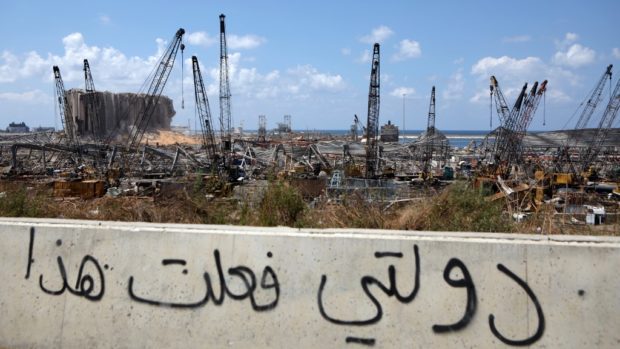Lebanon government on brink over blast fallout
BEIRUT, Lebanon — Lebanon’s government was teetering Monday as two ministers’ resignations over the deadly Beirut port explosion threatened to snowball and protesters’ fury on the scarred streets showed no sign of abating.

This picture taken on August 9, 2020 shows a view of graffiti drawn on the side of a road reading in Arabic “my country did this” and the cranes at the port of Lebanon’s capital Beirut, while in the background are seen the damaged grain silos opposite the blast site of a colossal explosion due to a huge pile of ammonium nitrate that had languished for years at a port warehouse. Lebanon’s political elite faced pressure from all sides after a deadly explosion blamed on official negligence, with the first cabinet resignation over the affair and angry protesters clashing with security forces. (Photo by PATRICK BAZ / AFP)
The under-fire cabinet, struggling to weather the political storm, was due to meet in the afternoon amid widespread demands for an end to an entrenched political system dominated by sectarian interests and family dynasties.
Six days after the enormous chemical blast, which wreaked destruction across swathes of the capital and was felt as far away as the island of Cyprus, residents and volunteers were still clearing the debris off the streets.
International rescue teams with sniffer dogs and specialized equipment remained at work at the disaster’s fire-charred “ground zero,” where the search was now for bodies and not survivors.
According to the health ministry, at least 158 people were killed in Lebanon’s worst peacetime disaster, 6,000 were wounded and around 20 remained missing.
The Lebanese want heads to roll over the tragedy and are asking how a massive stockpile of volatile ammonium nitrate, a compound used primarily as a fertilizer, was left unsecured at the port for years.
Article continues after this advertisementThe country’s top officials have promised a swift and thorough investigation — but they have stopped short of agreeing to an independent probe led by foreign experts.
Article continues after this advertisementTwo ministers have already decided they could no longer stand with a government that has shown little willingness to take the blame or to put state resources at the service of the victims.
Resignations
Environment Minister Damianos Kattar criticized the “sterile regime” when he announced his resignation on Sunday, hours after Information Minister Manal Abdel Samad became the first to quit.
At least nine lawmakers have also announced they would step down in protest, as have two senior members of the Beirut municipality.
The August 4 blast, which drew comparisons with the Hiroshima atom bomb, was so enormous that it altered the shape of not only of Beirut’s skyline but even of its Mediterranean coastline.
But it remained to be seen whether the disaster will also have a lasting impact on Lebanon’s political landscape, whose masters were widely seen as being primarily bent on self-preservation and buck-passing.
Prime Minister Hassan Diab gave a short televised address on Saturday evening to suggest early elections, but protesters were utterly unconvinced and ransacked several ministries even as he spoke.
During a second evening of protests on Sunday, the rage sparked by the explosion that disfigured Beirut and scarred so many of its residents had not relented, and violent street clashes flared again.
“The resignation of ministers is not enough. Those who are responsible for the explosion should be held accountable,” said Michelle, a demonstrator in her early twenties.
She carried a poster of a friend who was killed in the explosion, inscribed with the message “My government killed me.”
‘Direct’ aid
Demonstrators lamented that security forces were using tear gas against blast victims instead of helping them clean their wrecked homes and find a roof.
“We need an international investigation and trial to tell us who killed our friends and all the other victims, because they might try to conceal the truth,” said Michelle.
French President Emmanuel Macron supported the idea when he visited last Thursday, but his calls for reform and transparency appeared to receive less attention among Lebanese officialdom than his offer to raise aid money.
An online emergency support conference Macron chaired Sunday, attended virtually by a slew of world leaders including US President Donald Trump, came up with pledges for more than 250 million euros.
Macron, who was given a hero’s welcome when he trudged through the rubble of ravaged old Beirut to meet distressed residents, stressed the aid would go “directly” to the population.
Many Lebanese are sceptically waiting to see how the aid delivery will navigate a sophisticated and deeply entrenched system of local and sectarian patronage organised by the country’s party barons.
Lebanese aid groups have warned foreign donors that any financial assistance risked being syphoned away.
The Beirut disaster compounded what has become Lebanon’s annus horribilis, deepening a dire economic crisis which had dragged half of the country into poverty in recent months.
The obliteration of the port and its huge grain silos in a country hugely reliant on imports has sparked fears of food shortages in the coming weeks.
Adding to Lebanon’s woes, coronavirus cases are reaching new highs almost every day, putting further strain on hospitals that are treating blast victims and the dozens wounded in the repression of the protests.